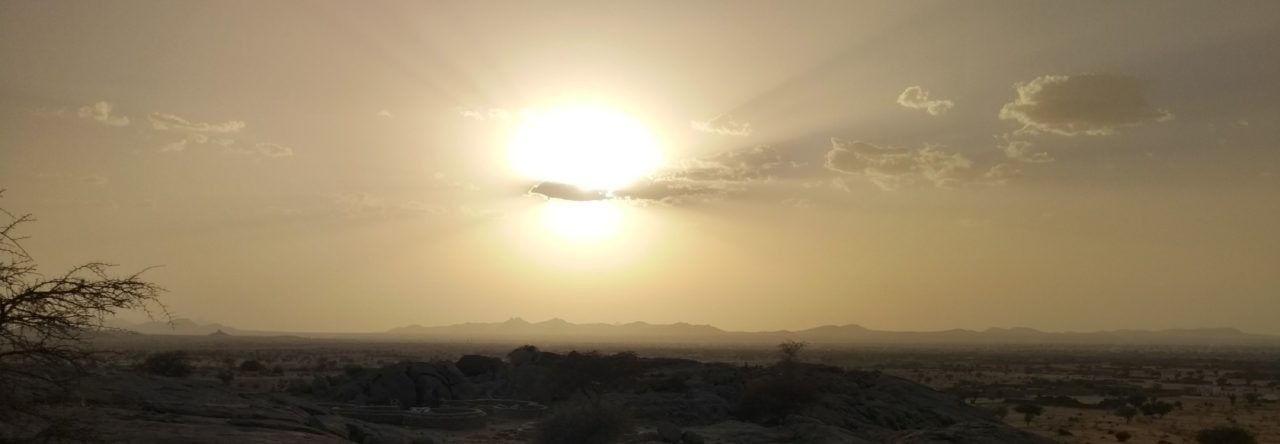I was sitting with my language partner the other day drinking coffee during a break in our lesson. Somehow we started talking about all the things that are forbidden in Islam. I think it actually started by me telling him about a nice Ethiopian coffee shop I found in N’Djamena, and mentioning that they also had shisha, which is the water pipe used throughout the Middle East and North Africa to smoke flavored tobaccos. In Egypt, you can’t walk a block on any street without seeing a bunch of guys sitting around a little bubbling, gurgling pipe that looks like something that would be illegal in all 50 states. He replied, “That’s haram (forbidden), along with cigarettes. Many people do this, but the real Islam doesn’t allow this”.
So he began to list all of the rules of food and drink in Islam. It’s forbidden to eat any animal that wasn’t butchered by a Muslim, who utters the words “Bismillah, Allahu Akhbar” (roughly, “by the name of God, God is the Greatest”) as he cuts the throat of the animal. The artery must be severed and all the blood drained. An animal found already dead must be left. An animal shot may be eaten if the words are said before pulling the trigger, because usually when an animal is shot it will die before you get to it. Only certain types of animals may be eaten. Camels, cows, goats, sheep, chickens, gazelle – yes. Donkeys, horses, dogs, cats, and above all pigs – no.
Alcohol is, of course, completely forbidden. It’s actually called something roughly translated “mother of all other trouble”. Interestingly though, Islam teaches that there will be wine in Paradise, but somehow it won’t make people drunk. Must be something more like the grape juice served in many communion services…
Anyway, as we left the little coffee stand and walked back to the language center, he asked the logical next question: “What does your religion say about the these things (smoking, drinking, eating pork)?” (Actually the first question was “Your religion, in English, what is it called? Christmas?”) I told him that the Bible doesn’t speak directly to the shisha, but that being made in the image of God we should not use or abuse products that cause irreparable harm to our bodies. I said that it’s well known that long-term heavy use of cigarettes and abuse of alcohol damage the body and that dishonors God. I think that may have been way too subjective for his liking, being accustomed to very discrete, objective rules: “Do this, don’t do that…”. But I think maybe that’s the first step towards understanding that we can’t use the law to climb up to God – this is impossible. Maybe I could relatively successfully follow the rules as they’re laid out in Islam. But if I move the target to honoring God, or obeying God, or glorifying God, and understand this as not just an outward action but an inward attitude, now I’m hopelessly lost. That’s what I try to do with this friend when we have the chance to talk.
We got back to the center, and before restarting our lesson I said, “You know, Jesus says in the Injil (New Testament) that it’s not what goes into the mouth that defiles a person, but what comes out of his heart. Our hearts are not clean, and that’s not because of something we ate or drank.” He replied, “Oh, you mean like the cup that’s clean on the outside but dirty within?” (he’s been around Christians for a long time and studied English for years at a center in town where they read the Bible in the upper levels). I said “Yes, like that. And Jesus also tells the religious leaders of his day that they were like whitewashed tombs, clean on the outside but inside full of death and decay.”
He thought for a minute and replied, “without Jesus, is it possible to have your sins cleaned?” I smiled and said “No, that’s the way God has given us. He sent Jesus to die, to be judged for our sins so that we could be made righteous.”
He came to the inevitable conclusion. “Your road and our road are very different, going different directions. It seems sometimes they are close, but on the matter of Jesus we are very far away.”
I agreed and we started back with our lesson.
Would you pray for my friend? He knows the gospel, having heard it many times from different people. He simply rejects it as untrue. He rejects Jesus as God, as having paid for our sins, or even having died. These are the teachings of the Qur’an, which he knows well. Please pray for his salvation, and even the salvation of his family, that the Spirit would “open their eyes, so that they may turn from darkness to light and from the power of Satan to God, that they may receive forgiveness of sins and a place among those who are sanctified by faith in me.” (Acts 26:18)
